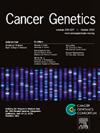三种FGFR4基因多态性与伊拉克中部和南部人群尿道癌易感性有关
IF 2.1
4区 医学
Q4 GENETICS & HEREDITY
引用次数: 0
摘要
背景:皮肤上皮细胞癌相当普遍,占所有病例的近90%。男性比女性更容易患此病,而且主要影响老年人。成纤维细胞生长因子受体4 (FGFR4)在细胞增殖和癌症进展中起重要作用。本研究旨在评估FGFR4基因多态性与伊拉克尿路上皮细胞癌风险之间的关系。方法从200份血液样本中提取基因组DNA样本。设计了3条引物来增强3个常见的遗传变异rs2011077、rs351855和rs1966265。单链构象多态性技术(SSCP)进行基因分型,并通过进一步的测序方案进行验证。结果携带rs351855基因型G/A变异的患者患尿路上皮细胞癌的风险显著增加(P = 0.001, OR 0.32, 95% CI 0.20 ~ 0.94)。rs2011077: T\C基因型病例也与UCC风险增加相关(P = 0.001, OR= 0.50, 95% CI = 0.33 ~ 0.76)。连锁不平衡揭示了rs2011077位点的T等位基因与rs351855位点的a等位基因之间的显著相关性,导致诊断为UCC的病例形成T\ a单倍型。我们的研究结果表明,FGFR4基因多态性(rs351855和rs2011077)与尿路上皮细胞癌风险增加有显著关联。结论目前的研究表明,特异性多态性已被证明是鉴别尿路上皮细胞癌易诊断和复发病例的主要遗传标记。本文章由计算机程序翻译,如有差异,请以英文原文为准。

Three FGFR4 gene polymorphisms contribute to the susceptibility of urethral cancer in the middle and south of Iraq population
Background
Urothelial cell carcinoma is quite prevalent, making up close to 90 % of all cases. Men are more likely to suffer from it than women, and it mostly affects the elderly. Fibroblast growth factor receptor 4 (FGFR4) plays an important role in cell proliferation and cancer progression.
Aim
this study was conducted to assess the association between FGFR4 gene polymorphism and the risk of Urothelial Cell Carcinoma in Iraq.
Methods
genomic DNA samples were extracted from a total 200 samples of blood. Three primers were designed to enhance three commonly observed genetic variation, rs2011077, rs351855, and rs1966265. The single strand conformation polymorphisms technique (SSCP) was genotyped and confirmed by further sequencing protocols.
Results
The results of this study show that cases with the G/A variant of the rs351855 genotype have a marked increase in risk to Urothelial Cell Carcinoma (P = 0.001, OR 0.32, 95 % CI 0.20 to 0.94). Cases with genotype rs2011077: T\C has also associated with the increased the risk of UCC (P = 0.001, OR= 0.50, 95 % CI = 0.33 to 0.76). The Linkage Disequilibrium revealed a significant relationship between the T allele of the rs2011077 locus and the A allele of the rs351855 locus, leading to the formation of the T\A haplotype in cases diagnosed with the UCC. Our results show that FGFR4 gene polymorphisms (rs351855 and rs2011077) have significant associations with increased risk of Urothelial Cell Carcinoma.
Conclusion
current study indicates that the specific polymorphisms have proven to be promising as a major genetic marker for identifying cases who may be more susceptible to diagnosis and recurrence Urothelial Cell Carcinoma.
求助全文
通过发布文献求助,成功后即可免费获取论文全文。
去求助
来源期刊

Cancer Genetics
ONCOLOGY-GENETICS & HEREDITY
CiteScore
3.20
自引率
5.30%
发文量
167
审稿时长
27 days
期刊介绍:
The aim of Cancer Genetics is to publish high quality scientific papers on the cellular, genetic and molecular aspects of cancer, including cancer predisposition and clinical diagnostic applications. Specific areas of interest include descriptions of new chromosomal, molecular or epigenetic alterations in benign and malignant diseases; novel laboratory approaches for identification and characterization of chromosomal rearrangements or genomic alterations in cancer cells; correlation of genetic changes with pathology and clinical presentation; and the molecular genetics of cancer predisposition. To reach a basic science and clinical multidisciplinary audience, we welcome original full-length articles, reviews, meeting summaries, brief reports, and letters to the editor.
 求助内容:
求助内容: 应助结果提醒方式:
应助结果提醒方式:


